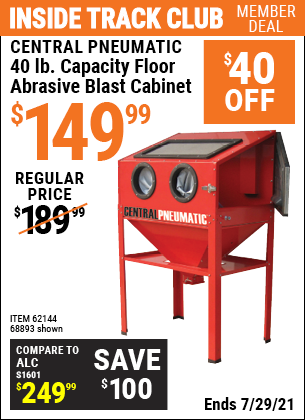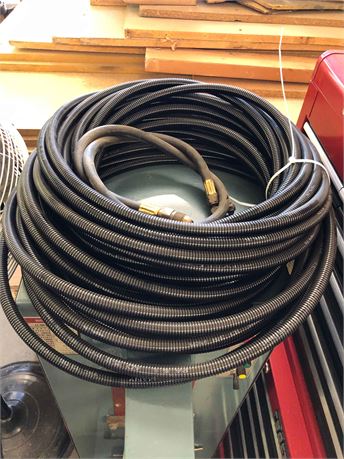If there is still plenty of abrasive in the tank, check the valves.
We'll provide you all the details to get started. Compressed air is under pressure, so the air molecules become slightly warmer than room temperature, due to friction. Usually, particles like burrs, paint chips, rust fragments, decals or other particles are clogging the line at either the gun or the other end of the pickup line. This type of blast cabinet has a line for compressed air, and a line that siphons abrasive media to the blasting gun. Eventually, this warms the tank above room temperature. If there is air flow at the gun, but no abrasive is coming through, the abrasive pickup line is probably clogged. To understand why this happens, lets look at the steps in the abrasive blasting process. Drain the water trap (air filter) on your air compressor. Remove the nozzle from the blast gun, inspecting the passageway for any obstructions. Built for heavy-duty use, our media blasting equipment and bead blasting accessories are manufactured in the USA, using the highest standards. This is one of the most important maintenance items for sandblasting cabinets.  You should drain the water trap every time you use the compressor in blasting to prevent rust. Every type of abrasive media has a certain number of uses before it fragments into particles too small to effectively strip and clean a surface. They may be obstructed or faulty.
You should drain the water trap every time you use the compressor in blasting to prevent rust. Every type of abrasive media has a certain number of uses before it fragments into particles too small to effectively strip and clean a surface. They may be obstructed or faulty.  All Rights Reserved.
All Rights Reserved.  This is a list of things to check if you have ruled out the most obvious problems.
This is a list of things to check if you have ruled out the most obvious problems.  If the water trap on the air compressor is full, that condensed liquid water can evaporate and re-enter the air line to the blast cabinet. If there is an inadequate supply of air, the compressor may be faulty. Home Blog Troubleshooting Abrasive Flow Problems in Siphon Blast Cabinets. Raptor Blaster cabinets are built to improve productivity in facilities, shops, and garages where time is valuable.
If the water trap on the air compressor is full, that condensed liquid water can evaporate and re-enter the air line to the blast cabinet. If there is an inadequate supply of air, the compressor may be faulty. Home Blog Troubleshooting Abrasive Flow Problems in Siphon Blast Cabinets. Raptor Blaster cabinets are built to improve productivity in facilities, shops, and garages where time is valuable.
If your blast media is at this point, even if the intake hose picks it up, the blasting power will be ineffective. Of the initial 24 liters of water, 15 liters can be removed by an aftercooler. Check the air compressor output pressure gauge to see if there is sufficient air pressure when the compressor runs. Our sandblasting cabinets are built for durability, even under heavy use. The air typically exits through a filter, which removes other small particulates from the air. These are some of the most common issues with abrasive flow in siphon blast cabinets. A refrigerated air dryer would then remove an additional 7 liter. If the abrasive has passed its maximum number of recycles, it needs to be disposed of and the abrasive in the tank replenished. Excessive moisture in the air and abrasive lines can be the root cause of many problems with abrasive flow in sandblasters. If you are blasting continually, and the air compressor has no time to cool down, the condensation may cause jamming in the lines. Today we are talking strictly about troubleshooting abrasive flow issues in siphon blast cabinets. That water needs to be removed, done in multiple stages. Abrasive doesnt last forever.
Address: 5800 88th St Sacramento, CA 95828. If your blast gun is not drawing any abrasive, turn off the compressed air supply. Raptor Blasting Systems designs and manufactures abrasive blast cabinets and sandblasting equipment for the commerical and industrial markets. If you are experiencing problems, or have a general question about abrasive blasting, contact us here, or call us at (916) 409-2458. Water traps remove already condensed water in the air compressor line. Another possibility if you have air flow, but no media, is that you need to add more abrasive to the tank. If your abrasive media flow seems off, check the air gun to see if the correct air pressure is being produced by the air compressor. The wider the nozzle orifice, the more air is needed to accelerate the media with the same force. 2022 Raptor Blasting Systems. The accelerated abrasive chews the nozzles up, widening the opening the compressed air and media is propelled through. If you have too much moisture in your air or abrasive lines, this can cause abrasive flow issues. All our Raptor Blaster products are proudly made in the USA. This can be drained out. Blast nozzles also wear out over time. Engineered for the industrial market, and anyone who desires a long-lasting, high-quality blasting cabinet. Here, the compressed air and abrasive mix together, and are expelled through the blast nozzle.
The warm air from the supply line is usually the source of condensation. If you live in an especially humid location, it may fill up even faster. The Raptor Blaster brand means solid construction, high performance, and consistent results over time. A compressor that supplies 20 liters of air per second also supplies 24 liters of water per day. Troubleshooting Abrasive Flow Problems in Siphon Blast Cabinets.
But how do you fix this? This is most commonly caused by having an air compressor that is slightly undersized for the blast cabinet volume. For industrial blasting applications, you may need to add a multi-stage air drying system. Creating an Anchor Pattern For Surface Coatings, Open Loop vs Closed Loop Wet Blast Cabinets. For heavy duty blasting setups, you may et up a dessicant air cooler in a subsequent stage to remove the most amount of water vapor possible. Siphon blast cabinets differ from pressure blast cabinets, where the abrasive media and air are compressed in a pressure pot, then expelled through a single hose through the blast nozzle. If your blasting gun seems to be lacking the force it did in the past, it may be time to get a fresh blast nozzle. If the air compressor does not have time to start, stop, and cool down during your blasting routine, it can cause excessive condensation. Does Your Water Source Affect the Wet Blast Process. The water trap fills up about once a week under regular use. The blast cabinet is cooler than the air from the supply line because the dust collector blower is circulating air, cooling the inside of the cabinet. If you're interested in becoming a distributor of Raptor Blaster sandblasting cabinets, please feel free to contact us. This pressurized air is then introduced to the blast cabinet, which is cooler than the air in the tank and compressor. The most common type of dry blast cabinet is a siphon blast (aka suction blast) cabinet. Air enters one side, and circulates around the recess, where condensed water from the air accumulates at the bottom of the trap.